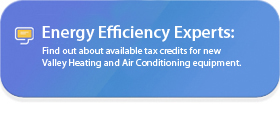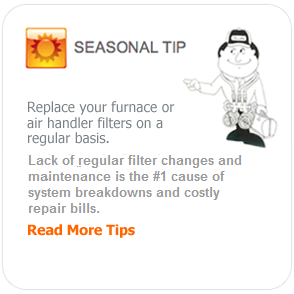Seasonal Tips
Spring and Summer Energy Savings and Cooling Efficiency Tips
Have your air conditioning system tuned-up for the season.
This will help ensure your A/C will run at peak efficiency. Operating at peak efficiency will save money because the system doesn't have to work as hard to do its job.
Replace your furnace or air handler filters on a regular basis.
Lack of regular filter changes and maintenance is the leading cause of system breakdowns and costly repair bills.
If you disconnected the power to your central air conditioning system in the winter, wait 24-hours after turning power back on to the system to run it.
Your compressor needs that time to warm-up.
Keep the thermostat constant.
Continuously adjusting the thermostat can be very inefficient. You can, however, raise the thermostat 2-3 degrees during the day while you're away to save money. For every degree you raise the setting, you can expect to cut energy consumption by up to 3.5%
Flip the fan switch on your thermostat into the "fan on" mode when cooling the house.
To save on utility bills and service calls, we urge you to take a preventive approach to heating and cooling. All of your heating and cooling systems should be included in a regular inspection and maintenance program.
Flip the fan switch on your thermostat into the "fan on" mode when cooling the house.
This process will ensure that air is always being stirred to prevent hot and cold pockets from forming.
Set air vents on the second floor to receive approximately 75 percent of the conditioned air.
This will help even out the temperatures from the first to the second floor of the home.
Install awnings or plant trees that will shade southern facing windows.
This keeps the hottest rays of the sun from shining directly into the house.
Install an attic fan to help ventilate some of the hot air out of the attic.
Attics can reach temperatures of 140-150 degrees and this build of warm air can make the upstairs of a home warmer than it needs to be. This makes the air conditioner work harder to do its job. It costs you more to cool your home and the life of the system can be decreased.
Fall and Winter Energy Savings and Heating Efficiency Tips
Set your thermostat properly or invest in a programmable thermostat.
The most economical operation of your system comes from setting the thermostat properly. Set the thermostat at the highest summer setting or the lowest winter setting at which you are comfortable. Typical settings are 78 degrees for summer cooling and 68 degrees for winter heating. When cooling, your operating costs increase from 3% to 8% for each degree your thermostat is lowered. When heating, your operating costs increase similarly for each degree your thermostat is raised.
Keep the air filter clean.
The easiest way to ensure your system operates efficiently and economically is by keeping the air filter clean. There are several types of air filters and several possible locations for the air filter. Ask your service technician next time he's out at your home to show you where your air filter is located and which type of filter to use. If you have allergies, you should look at a pleated allergy filter or a media or electronic style air cleaner.
Keep doors and windows closed.
Close all doors and windows to the outside. This will reduce the heating load in the winter and the cooling load in the summer. Your system will operate more economically as a result.
Make sure vents and grilles are unobstructed.
Arrange your furniture and drapes so that all output vents and intake grilles are free from obstruction. This will reduce the cooling and heating load on your system for more economical operation.
Avoid excessive use of exhaust fans.
Excessive use of kitchen or bathroom exhaust fans will make your system work harder. This will increase energy consumption and costs. Keep costs in check by making wise use of exhaust fans.
© Air Conditioning Contractors of America Association, Inc., www.acca.org. Reprinted with permission.




